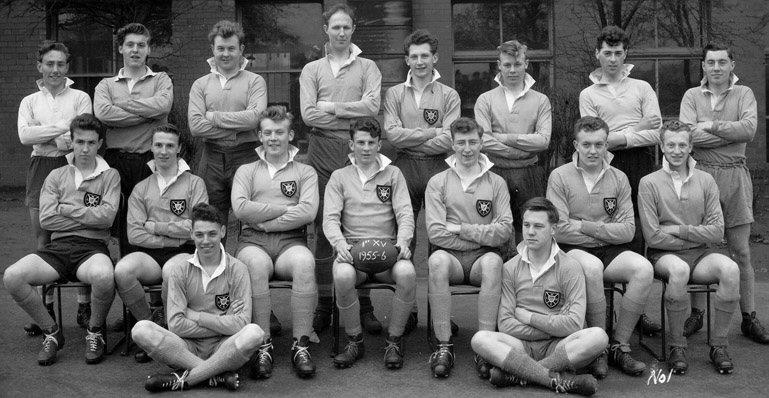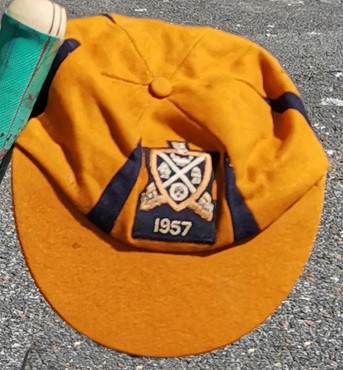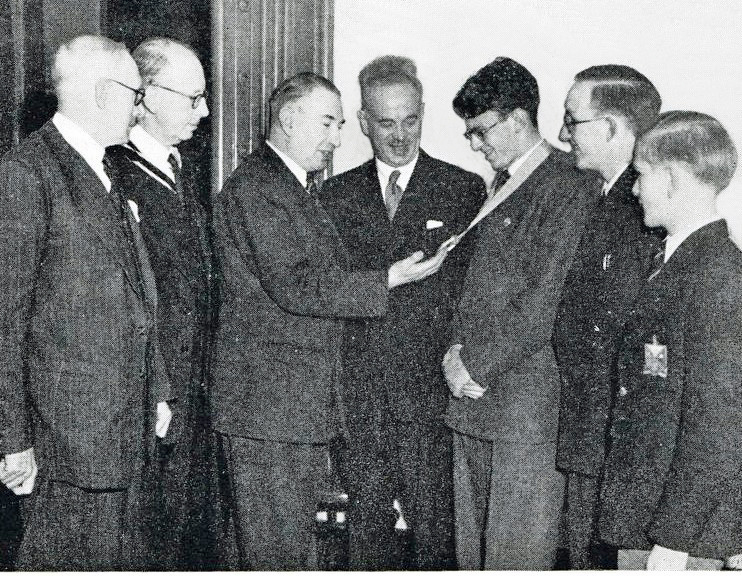|
John Cooper at West Leeds High School, 1943-57 ( continued)
by Richard Collier
Foreword:
John Cooper was head boy at
WLBHS in 1957 when the school celebrated its 50th Anniversary, as well
as being a talented sportsman who was capped for the school at cricket.Sadly,
he passed away this year. His lifelong friend, Richard Collier, has written
a biographical memoir of his school days. He was one of the last cohort
of pupils to join the school kindergarten in the 1940s.
Part 1 covered his years in the kindergarten
and junior school. In Part 2 we follow his sporting and academic progress
through the senior school. -JS
|
Part 2: Senior school.
To get into Senior School there was an exam to pass. We were extensively
coached and knew what to expect. Most of it seemed to involve ticking
boxes.
There were A, B, and C streams in senior school. There were now
four houses instead of two. Which house was probably down to your
name alphabetically. John went into Priestley House, and it was
blue, so there was no change in house colours for him. The other
houses were Hook (red), Oastler (green), and De Lacy (purple).
Joseph Priestley stands outside what used to be the post office
in City Square, a looking-glass in one hand, and a bowl in the other.
From here he looks across to Mill Hill Chapel where he was a dissenting
minister in 1767. There is another statue of him in Birstall. Priestley
is described as a chemist, natural philosopher, separatist theologian,
grammarian, multi-subject educator, and liberal political theorist.
This is quite apt as John now develops a special interest in chemistry,
and then spends his life as a multi-subject educator. John's theology
is not Priestley's Uniterianism, but is definitely secessionist
as far as the Church of England is concerned.
John is put into the A stream on the lower floor. It is the first
classroom that you come to, and also used for detention. The Juniors
are no more. One class photograph includes John with Mr. Pearson
as teacher in charge. He was the classics teacher. Another photo
shows John in the 4th form, but still young enough for the school
under 14 rugby team. John starts to be seen in glasses, although
not in this one. He was in the street one day not looking where
he was going, and his forehead was in collision with a post. His
Mother said that his eyesight was never the same after that.
Arthur Fox was the teacher responsible for John to be known as Joe
for the rest of his school life. It was when they met in class for
the first time. Arthur greeted him by saying "Hello, so you're
Joe Cooper's son. I taught your Father." John said that it
was a great pleasure to present Arthur with his leaving present.
It was in the magazine of 1955 that Arthur Fox is now reported seriously
ill. John Coates wrote the following about Arthur Fox, when asked
which teacher he remembered most. He said- "No one could forget
the stentorian voice of Arthur Fox. Uncle Arthur, or 'Nunc,' was
a man with fantastic teaching skills in a dry subject, Latin. He
held us in awe. We learned our vocabs and did our homework assiduously.
Otherwise impositions, or 'poultices' awaited us. He jotted it down
in his diary, but rarely remembered to collect them the next day."
|
 |
Of all the teachers John may have known the best was
'Jock' Ewart. The chemistry rooms were part way along the bottom corridor,
with the physics room at the very far end. Mr. Ewart had been teaching
chemistry here for a very long time. He was about to retire. We can
all remember how experiments were set up, studied, and a conclusion
written at the end. There was chasing a blob of mercury around a hollow
charcoal block, chunks of sodium zooming across water tanks, and the
bright flashes of magnesium ribbon. The lab was filled with solid
benches, each having little sinks, and gas taps with bunsen burners.
You would be always heating things in test tubes.Jock Ewart was the
school punster, and his sayings were remembered for a long time.
"It's p.o.t.A.S.S.i.u.m. One S and you're the ass boy."
"Carbon dioxide will turn litmus paper reddish, but not as reddish
as a raddish."
The word Valency kept cropping up. This is the combining power of
an element, as measured by the number of hydrogen atoms it can displace
or combine with. So it must be found in chemistry. Mr. Ewart managed
to put this well known pun of his into his leaving speech, no doubt
describing how he could look over the vale and see something or other. |
|
Music and Drama
John has always been in the choir. He started out as a soprano
obviously. I could still sing soprano in the fifth year, which got
me some funny looks. The school day started off with a morning assembly
in the hall, with everybody attending. As saying the Lord's Prayer
was not going very well, there was a decision at this time to set
it to music. Everybody had a little blue hymn book. I remember liking
no. 618. The school year would finish in July with a three day concert,
Tuesday to Thursday. The concert programme of 1953 puts John in
the tenors. In 1955 it puts him now in the basses. He is also a
keen member of the Dramatic Society, and has been appointed the
secretary. Finally he stars in a production called 'The Phantom
Light,' playing the part of Jerry Mannett, the speed-boat king.
That ran for three nights in 1955, the last night being the 1st
of April. John's Mother and sister attended on one of the nights,
and in the interval walked up the stairs, following the art display,
then along the corridor where my oak dressing table was on show.
|
|

|
|
High Jinks
One day the senior boys managed to get hold of a master key, and
with it locked the girl prefects into their common room. That meant
crossing into the forbidden half. Normally things were well under
control here. It was John who was summoned down into the Headmaster's
study to discuss the incident. Mr. Barnshaw quietly advised John
that it would be the gentlemanly thing to do to go and see Miss
Guest and apologise. On his way back up the staircase he met Stan
Wilson coming the other way, and the two of them started to discuss
the incident. Stan did not approve of Fanny Guest, not one little
bit. He asked if any of the rugby forwards were involved, and when
John said yes, Stan advised him to take all the team along as well.
This proved a big squash when they all tried to get into Miss Guest's
room. Being surrounded like this started to drain her confidence.
Actually Stan had caught some of the senior boys and girls playing
a game in the gym one lunch time. He told them to carry on, and
he would come back later.
John told me of some of the things that would make a lesson in class
more enjoyable. There were subtle ways of pushing a teacher so far,
without tipping him right over the edge. One was the trick of feeding
a certain boy wrong answers all the time, and after he had realised
that, they would give him the correct ones. By that time, however,
he thought these were wrong. You could tamper with the sticks of
chalk, the blackboard, or the electric wall socket. John's class
once gave a window the appearance of being cracked using a thin
line of milk. It fooled the teacher, and caused more confusion when
secretly wiped clean. You still had a free one third of a pint until
Margaret Thatcher put a stop to it. The area in front of the blackboard
was slightly raised as a platform. It was a good trick if you could
manage to get the teacher to fall off the edge. I was told two ways
of doing it.
|
|
Sporting achievements
John is at this time, Priestley House Captain. He is also Captain
of the 1st XV Rugby Team (1955/56).
For this he was awarded his colours. The same badge can be seen
on his blazer pocket. He is an indispensable part of the 1st X1
cricket Team, hitting a mighty six against Rothwell. John makes
up the numbers in the school cross country team, and comes second
in the open mile, and the 880 yards on Sports Day to help his House
win.

His time in the sports teams is of interest. There was the school
rule that boys should wear their school caps in the streets. The
Wytherites near me would shout out "Ya, Ya, banana splits."
There was something banana-like about part of the design. The First
X1 of the cricket team in John's time thought that a new look should
be possible, and reversed the colours. John had the year 1957 put
on his cap badge. It looked good. Some of the team played for other
clubs and received excellent coaching there. Dave Sullivan played
with the Yorkshire Colts and Seconds. Hammond had played for the
Yorkshire Under 15's. Hutchinson, the fast bowler, played for the
Leeds team.
When I was made captain of the Junior De Lacy cricket team by Mr.
Mounsdon, on the recommendation of fellow pupil Peter Ibbetson,
I chose Hutchinson to open the bowling, then put Tom Holloway on
at the other end. I cannot remember who we played against, or who
won.
Cricket was played on a Saturday afternoon, or occasionally mid
week later in the season. The team spirit in this First Eleven was
high. Any one of several umpires might accompany the team. Harry
Sharratt, the well known Bishop Auckland goalkeeper, who came here
to teach, was chosen to umpire the match at Scarborough, and he
arranged to join the coach in York. The boy's team wanted to prove
some sort of a point, and took caretaker Mr. Sellars with them,
and did not stop at York. They were a law unto themselves. The boys
helped prepare and roll the wicket during the week. They beat the
Old Boys in what was an undefeated season- 1957. The cricket square
was surrounded by white posts, which was normal. Some boys must
have organised a night time working party, because on arrival at
school one day some years earlier, we found that somebody had climbed
on the toilet roof and hung a white sheet covering the staff room
window, with the words, 'Foggy today isn't it.' On top of the one
remaining WW2 air raid shelter, used to store athletics hurdles,
and other things, the word TEAS was spelled out using the white
cricket posts.
As with the cricket team, the rugby players had the responsibility
of arranging their own fixtures by writing to the staff of the school
concerned. Some schools were a long way away. The fixture card of
the 1956-1957 season was the boy's unaided work. The previous year
had seen some undoubted successes, notably when Wakefield Grammar
school were beaten 6 -0. This had been unheard of. Everything about
Wakefield was impressive, right down to the corner flags that included
a posh emblem. Our boys brought one home as a souvenir. Michael
Bartley was the most successful of the team. He was chosen to play
for Yorkshire against Durham. Although much congratulated on his
performance, he was immediately replaced by a public school person.
The team for this year had a heavy pack, and could push opponents
backwards. It was Mr. Gould who looked after the rugby. He had been
teaching at West Leeds for the last 35 years, and was now about
to retire. When John was playing at home, his Grandfather Fenton
would walk all the way from Henconner Lane to watch. Keith "Dickie"
Lincoln, a fellow pupil, would involve himself providing half time
refreshments.
Dickie exuded super efficiency. His mannerisms were interesting
to watch. I can see him to this day.
|
|
This was John's cricket cap . In those days the 1st XI team was
a law unto itself and they decided to reverse the blue and gold
colours of the school cap. The Headmaster thought it was a good
idea and for a few years in the 1950s, these were awarded to the
1st XI cricket team, who prbably wore them when they went out to
bat.
One of these came up for sale on e-bay and nobody knew what to
make of it . At first sight it looks as though it could be an early
attempt at kodachrome processing gone horribly wrong in development
or a school cap someone has bleached in the chem lab.
|
 |
|
Sixth form years
Being three years in the sixth form allowed John to become Head
Boy. It was the perfect choice.
John was Head Boy in the last half of 1956, and the first half of
the year celebrating the Jubilee [of the school's opening in 1907],
and that was 1957. He delivers the vote of thanks in the Town Hall
during the Speech Day in 1956.
He said that it was rehearsed before, apart from any useful last
minute ad libs.
He is invited to the council chamber when Alderman J. Hiley, our
famous old boy is elected Lord Mayor. There is a photograph of the
occasion in Oswald Harland's book about the school, taken at the
time. He would also be invited to Old Boy functions, like the Annual
Dinner, in the Guilford Hotel opposite the Town Hall.
|
 |
 |
|
John gave a January lecture to fellow members of the Science Club
on the subject of 'Disc Recording and Reproduction.
It is thought that John was getting interested in aspects of metallurgy
at this time.
At the Speech Day on the 28th November 1957, John was awarded the
following-
The Head Boy's Prize. The Upper 6th Prize for Science. The Frederick
Prize. His 3 A Levels.
He must have come up from Cambridge for this Speech Day in Leeds,
having been accepted at Fitzwilliam House in Cambridge, and having
just started there. This had been recommended by one of the school
teachers. Another sixth form boy had gone there the year before.
|
|





